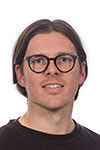Gareth Proskourine-Barnett
Gareth Proskourine-Barnett is an artist, researcher and lecturer. Since graduating with an MA in Communication Design from Central Saint Martins in 2011 he has worked on a range of self-initiated and commissioned projects, taken part in artist residencies and delivered workshops internationally.
His practice incorporates film, performance, publishing and sculpture to examine notions of progress, change and dis-location, reflecting a landscape in a continual synthetic flux. By applying a materialist reading of the Internet as a space - not a virtual, abstract cyberspace but an augmented version of the old, real world – through his research he attempts to re-animate our relationship to place and the way that documentary practices can record histories that are being lost, forgotten or misplaced.
Gareth is currently working towards a PhD at the Royal College of Art in the department of Critical and Historical Studies. His practice-led research looks to cyberspace to provide a territory in which the ruins of Brutalist Architecture can be excavated and (re)imagined to (re)claim and (re)locate the utopian ambition of past gestures. Brutalist architecture providing a narrative device to reconfigure our relationship to images and places that are unstable, exploring the entanglement of past, present and future to imagine a world where ruins have become utopias and where archaeology and futurism merge. By adopting an essayistic approach in combination with archaeological and archiving methods, I aim to investigate the diverse ways that narratives are encased within image objects that move between online and offline modes, particularly the slippages to meaning that arise through acts of displacement.
Recent projects have included ‘Fractured Perspectives Part 1’ - a performative lecture that weaves together real and imagined histories by adopting the role of the cyber-flaneur to interrogate examples of Brutalist architecture on the internet. As the material of the buildings dissolves in cyberspace, so does the idea that architecture is static or immobile. The performance explores the implication of these movements for Brutalism and how this alters our perception of fact and fiction. Gareth has performed this lecture at TAG 2016 (Theoretical Archaeology Group), Flatpack Film Festival 2017, Shaping the View (Illustration Research), JRAD 2017 (Design and Urbanism of the University of Buenos Aires), EVA 2018 (London) and Digital Materialites (Harlesden High Street Gallery, London).
In June 2018, Gareth launched ‘Conc(re)te’ at the RE - F O R M Design Biennale in Denmark. An open-access archive of digitised concrete fragments from the now demolished Birmingham Central Library. 3D scans of the concrete debris are available as mutant copies to download, reuse and repurpose, creating the opportunity to rethink our relationship to the materials of our constructed world(s) and the narratives embedded within them. This digital archive was exhibited alongside an exhibition of 3D printed replica concrete debris. The project has since been showcased as part of the V&A’s Digital Futures Event at the British Institute of Computing and is now being used to deliver a series of experimental workshops with universities across the UK.
Alongside his personal practice, Gareth collaborates with artists and designers on publishing projects under the name Tombstone Press. In 2018, Gareth published ‘Affectation Correspondence’ in collaboration with Annabel Frearson and Regular Practice. The book is an experimental science-fiction short story and forms part of Annabel's ongoing major project Frankenstein 2, which aims to reconfigure the entirety of Mary Shelley’s Frankenstein (1831) using all and only the words from the original into a new expanded novel and associated works. In 2013 Gareth collaborated with Graphic Designer David Wrenne on ‘How Buildings Kill’, an anthology of writing including Owen Hatherley, Ken Hollings and Jacqueline De Jong.
